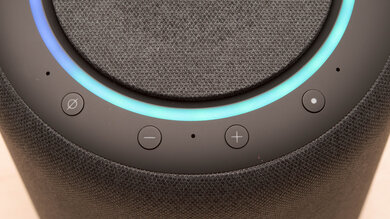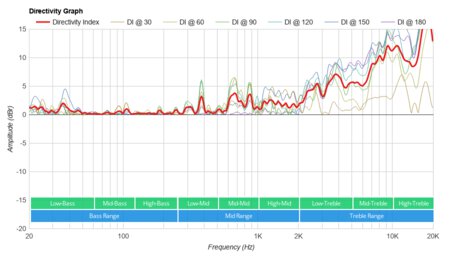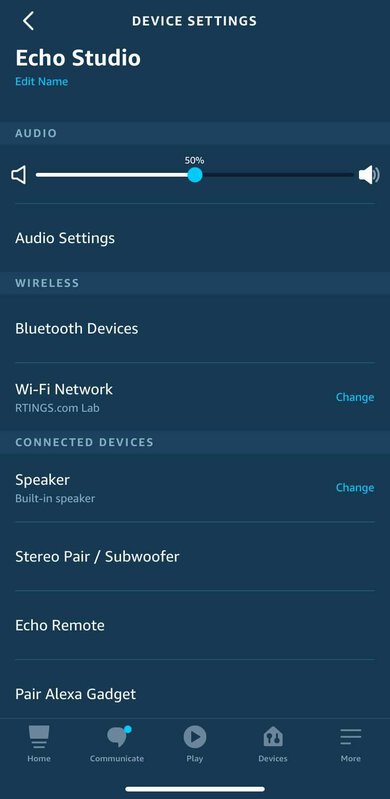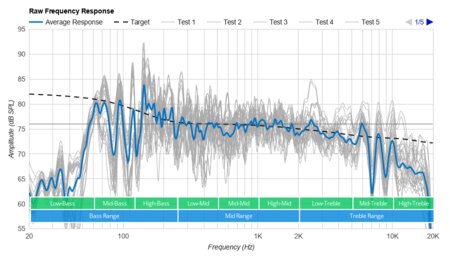The Amazon Echo Studio (1st generation) is a wired smart speaker. It has a built-in Zigbee hub, allowing you to connect other compatible smart home devices like light bulbs or thermostats to the speaker and control them using the built-in Alexa voice assistant. This speaker can also get loud, offers bass and treble sliders if you prefer a different sound profile, and supports 3D audio. However, you need a subscription to Amazon's music streaming app to get the full experience of this feature.
Our Verdict
The Amazon Echo Studio (1st generation) is decent for music. It has a neutral and balanced sound profile but lacks low bass, so genres like EDM and hip-hop sound less thumpy. That said, its companion app has bass and treble sliders, so you can tweak its sound to your liking. It can also play stereo content and get loud with minimal compression artifacts at max volume. While it supports 3D audio, you need a subscription to Amazon Music HD to access this feature.
- Can get loud with few compression artifacts.
- Bass and treble sliders available via companion app.
- Can only be used wired.
- Lacks low bass.
The Amazon Echo Studio (1st generation) is mediocre for videos and movies. Although it lacks low bass, which makes sound effects in action movies lack thump and rumble, it has a fairly neutral sound profile suitable for clear dialogue. It can also play stereo content and get loud with minimal compression at max volume, so your audio sounds clear. It's also advertised as compatible with the Fire TV Cube (2nd gen) or Fire TV Stick 4K if you want Dolby Digital 5.1 or Dolby Atmos content.
- Can get loud with few compression artifacts.
- Bass and treble sliders available via companion app.
- High AV Synchronization error on iOS and Android.
- Lacks low bass.
The Amazon Echo Studio (1st generation) is passable for podcasts. It has a neutral sound profile that's suitable for vocal-centric content, although a slight underemphasis in the treble range makes sibilants like S and T sounds a bit dull. That said, it isn't very portable as you can only use it wired and doesn't support multi-device pairing. It also has a narrow soundstage, so your audio won't sound consistent from all angles.
- Can get loud with few compression artifacts.
- Bass and treble sliders available via companion app.
- Can only be used wired.
- No multi-device pairing.
The Amazon Echo Studio (1st generation) is very good for voice assistants. It has Alexa built-in, and it can register your commands, even if you're far away. However, it has more of a problem understanding you in a noisy environment. That said, you can use Alexa to connect your speaker to other smart devices that use Zigbee in your home, and it has a dedicated mic mute button if you don't always want the speaker to be listening to you.
- Can get loud with few compression artifacts.
- Excellent voice assistant performance.
- Alexa struggles to understand you in noisy environments.
The Amazon Echo Studio (1st generation) is a wired speaker unsuitable for outdoor use.
Changelog
-
Updated Jan 30, 2026:
We've added a comparison to the Amazon Echo Studio 2025 in the Frequency Response Accuracy box.
- Updated Feb 20, 2024: We've updated this review to ensure it remains consistent with other product reviews and added relevant comparisons.
- Updated Dec 05, 2022: Added a market comparison to the Devialet Mania in the Voice Assistant box.
- Updated Feb 09, 2021: Review published.
Check Price
Differences Between Sizes And Variants
The Amazon Echo Studio (1st generation) comes in two color variants: 'Charcoal' and 'Glacier'. We tested the 'Charcoal' variant but expect all variants to perform similarly. You can see the label of our model here.
If you encounter another variant, please let us know in the forums, and we'll update our review.
Popular Speaker Comparisons
The Amazon Echo Studio (1st generation) is a smart speaker designed for home use. It gets much louder than the Amazon Echo Gen 4 but doesn't do as good a job of registering voice commands in noisy environments. It also has a more balanced sound profile than the Google Nest Audio and doesn't have to downmix tracks to mono. However, the Google speaker has a better integration with Google Assistant.
Check out our recommendations for the best home speakers, the best Bluetooth speakers, and the best Bluetooth speakers under $100.
The Amazon Echo Studio (1st generation) and the Amazon Echo Gen 4 are similar speakers. These two smart speakers come with Alexa built-in. They also come with Zigbee hubs built-in to connect and control smart home devices like lightbulbs or thermostats via Alexa. However, the Studio can get louder with less compression at max volume, resulting in cleaner audio at louder volumes. It also supports Dolby Atmos content, which may please some movie fans. The Gen 4 does a significantly better job of registering your commands in noisier environments.
The Sonos Era 100 is a better all-around speaker than the Amazon Echo Studio (1st generation). While they're both wired speakers with similar build qualities, the Sonos has better directivity, meaning it sounds more consistent across all listening angles. It's also compatible with Apple Airplay and has a more intuitive control scheme. That said, the Amazon has less compression present at maximum volume than the Sonos.
Depending on your listening habits, you may prefer either the Amazon Echo Studio or the Apple HomePod (2nd generation). These speakers are designed for integration with products that are in their respective ecosystems, like Amazon's Zigbee hub or Apple's AirPlay. Apple's Siri does a bit better at hearing your commands in noisy environments, and it brings more rumble in the low bass. However, the Amazon speaker is more customizable thanks to its companion app's bass and treble adjustments.
The Amazon Echo Studio (1st generation) is a better speaker than the Apple HomePod mini. The Amazon can get louder with less compression at max volume, so your audio sounds mostly clean at louder volumes. It has Alexa built-in and can understand your commands from far away. You can connect your audio source to the speaker via Bluetooth, and the speaker also has a Zigbee hub built-in, so you can connect and control compatible smart home devices like lightbulbs or thermostats using Alexa. The Apple speaker has built-in Siri, which some iOS users may prefer.
Test Results


The Amazon Echo Studio (1st generation) is a cylindrical speaker with two openings near its bottom for its bass aperture. You can only place it vertically. There's also a light ring on its top side, which lights up for voice commands or mic mute. However, you can't customize its lighting as you can with the JBL Pulse 4.

This speaker has poor portability. You can't carry it with only one hand, and it isn't battery-powered, so you need to connect it to a power source to work. It's designed to be a home speaker, so this won't be an issue if you have it set up in one room.

This speaker has an unremarkable build quality. A tight fabric covers most of the speaker, while a plastic ring houses the control buttons on the top side. Overall, the speaker feels sturdy and solid. However, it lacks an IP rating for dust and water resistance, so be careful if you plan to use it around water.

The controls are mediocre. There are four physical buttons located on its top side. You can mute the microphone and control the volume. When you press the 'Mic Off' button, the light ring turns solid red, and if Alexa is listening to you, the light turns blue. There's also an 'Action' button that allows you to activate Alexa manually, or if you press and hold this button for 20 seconds, you can reset your device without losing your smart home connections. However, this speaker lacks music or call-related calls, which some users will find disappointing.

- Amazon Echo Studio (1st generation) smart speaker
- Power cable
- Reusable bag
- Quick Start Guide

The Amazon Echo Studio (1st generation) has alright frequency response accuracy. It has a balanced and neutral sound profile that's suitable for a variety of audio content. However, it lacks low bass, so more bass-heavy genres like EDM and hip-hop lack thump and rumble. The next-generation Amazon Echo Studio 2025 improves upon this somewhat with better bass extension, if you prefer a warmer sound. This speaker has bass and treble sliders if you want to make some adjustments, though.
We tested this speaker with the 'stereo spatial enhancement' feature on, which is also its default setting. The manufacturer advertises this feature as enabling a more immersive listening experience by creating 3D sound. Note that some users originally reported issues with this feature, as it made their audio sound echo-y. Amazon later released firmware version 338972762, which may have improved its performance. We tested this speaker with firmware version 4463523716. If you prefer, you can also turn this feature off through the companion app. The manufacturer advertises this speaker as supporting both Dolby Atmos and Sony's 360 Reality Audio content. However, if you like Ultra HD audio, this speaker can only stream this content using Amazon's Music HD streaming service right now.

The soundstage is decent. The speaker can play stereo audio without having to downmix to mono. However, its directivity is just okay, so audio won't sound the same from different angles around the speaker. For a speaker with better directivity, consider the JBL Pulse 4.

This speaker has great dynamics. It can get louder than the Bose Home Speaker 300, and there are minimal compression artifacts at max volume, so your audio sounds clear, even at high volumes.
This speaker has no battery and only works when plugged into a wall socket.
This speaker has excellent voice assistant support. It has Alexa built-in, which you can activate with your voice. The speaker can understand your commands, even when you're far away. However, compared to other Alexa speakers like the Devialet Mania, it has a harder time hearing you if you're in a noisy environment. You can also mute the speaker's mic if you don't want the speaker to hear you.

The Amazon Alexa app is outstanding. It has bass and treble sliders, so you can adjust its sound. You can also pair two Echo Studio speakers together to create a stereo pair, as well as connect several units to cover a large room or play audio in multiple rooms of your home. If you're looking for a speaker with a graphic EQ and presets, consider the Yamaha MusicCast 50.
This speaker has a 3.5mm AUX port, so you can wire your smartphone directly to the speaker to play audio. There's also a mini optical line-in as well as a micro-USB port. You can also use the micro-USB port with an Ethernet adapter to facilitate a wired network connection.
It has alright Bluetooth connectivity. You can only pair it with one device at a time, and it has high AV synchronization error on iOS and Android, so it's not a suitable choice for streaming videos. Some apps compensate for latency, so your real-world experience may vary. On the upside, it has an outstanding range, so you can still be connected to the speaker, even if you're far away.
This speaker is Wi-Fi compatible. However, it doesn't support Apple AirPlay or Google Chromecast connectivity. If you're looking for a speaker that supports Apple AirPlay, try the Sonos One Gen 2/One SL or the Bose Home Speaker 500.

